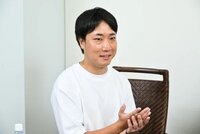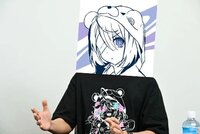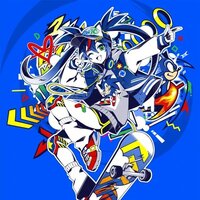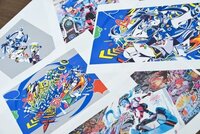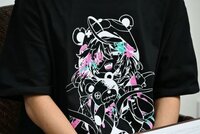4Gamer interview about Project Onsoku:


[PART-5]
(translated from the original interview:)
https://www.4gamer.net/games/882/G088214/20250826001/
The intersection of Vocaloid culture and rhythm game culture
 4Gamer:
4Gamer:
This is a bit off topic from Sonic Racing Cross Worlds, but since this is a rare opportunity to speak with you, I'd like to ask you some more in-depth questions. You seem to like games, so I'd like to ask about your gaming history.
Kairiki Bear:
Speaking of the Sonic series, I played a lot of Sonic the Hedgehog 2 on the Mega Drive and Sonic Adventure on the Dreamcast . I was a kid, but the background music just wouldn't leave my head, and I think it must have had some musical influence on me. It was difficult, though, and I couldn't complete it.
4Gamer:
What about games outside of the Sonic series?
Kairiki Bear:
I also like fighting games, and I enjoyed Sega titles like Virtua Fighter , Fighting Vipers, and Fighters Megamix . As for racing games, I played Sega Rally Championship quite a bit.
Kobayakawa:
Incidentally, the development team for Sonic Racing Cross Worlds was originally the Sega Rally team.
Kairiki Bear:
Oh, really!?
4Gamer:
That was the former AM3 Labs (3rd AM Research and Development Department), right?
Kobayakawa:
That's right. The racing game team at AM3 Labs at the time went through many twists and turns to become the "Initial D ARCADE STAGE" team, and has since evolved into the current "Sonic Racing Cross Worlds."
4Gamer:
By the way, what about rhythm games?
Kairiki Bear:
I love playing them. I got into them with "beatmania IIDX," and then I played "maimai" and "CHUNITHM ".
4Gamer:
...Are people involved in music also good at rhythm games?
Kairiki Bear:
I don't think so at all (laughs). I think it all depends on the amount of time you put into it. I also think that people who have been working on it for a long time can create better songs.
 Okuni:
Okuni:
However, I do have the impression that more and more people are discovering their passion for music composition through rhythm games. That's exactly what I did, but paradoxically, there may be people who are good at rhythm games from there. Even when we hold competitions within the company, many of the applicants are former rhythm game players.
Kobayakawa:
When I ask Vocaloid producers to create songs, I often hear them say they liked that rhythm game. "CHUNITHM" in particular is often mentioned, partly because of the generational connection.
4Gamer:
Is there a big difference in songwriting between rhythm games and other genres?
Kairiki Bear:
In my case, "Rei Rei," which I wrote for "CHUNITHM," is a song that was very rhythm game-inspired, and I was conscious of including various parts in a short amount of time. I usually keep the composition simple to make it easy to remember, but I packed in melodies and patterns to add variety within the song.
Okuni:
Rhythm game songs develop very quickly. While a typical song would be 8 bars x 8 bars, in rhythm games it's 4 bars x 4 bars. It quickly transitions to another part, from the A melody to the B melody. The overall length is also determined, and currently it's around 2 minutes to 2 minutes 20 seconds. The maximum length we order is about 2 minutes 40 seconds.
Kobayakawa:
Until around 2000, the standard length was around 1 minute 30 seconds, but around 2010 it became 1 minute 45 seconds, and with the release of "CHUNITHM," it got even longer. "CHUNITHM" was the most popular rhythm game in the 2010s, so while we were making songs saying, "I want to hear it for 2 minutes," other games also ended up being longer than 2 minutes. Taking these changes into account, the way we order songs changes depending on the time.
Kairiki Bear:
On the other hand, in the Vocaloid music scene, songs are getting shorter and shorter.
Okuni:
That's right. Vocaloid songs used to be five minutes long, but now they're three, and rhythm games went from one and a half minutes to two and a half minutes. I get the impression they're getting pretty close.
Kairiki Bear:
It's a really interesting phenomenon that the lengths of rhythm games and Vocaloid songs are matching up.
4Gamer:
Is there a reason why Vocaloid songs are getting shorter?
Kairiki Bear:
I think it's probably the influence of TikTok. People just keep listening to the part of the video they want to hear. If the intro or guitar solo is too long, people will swipe past it, so they start right from the verse.
Okuni:
That's what's happening in music as a whole. Songs are moving forward overall, and the rest of the song is getting shorter in comparison.
Kobayakawa:
I really feel there's a trend toward more and more compression in line with the times. PJ ONSOKU's theme of "speed" may be very relevant in that sense. By increasing density, we can create music that young people can listen to.
4Gamer:
Your music has an up-tempo, pop feel, but the lyrics, when you look closely, tend to have different connotations. Is this intentional?
Kairiki Bear:
Yes, it is. I think the way you've seen the world throughout your life is reflected in your lyrics.
4Gamer:
Do you feel like you're expressing what the times demand? Or is it something that wells up from within you?
Kairiki Bear:
I think there's an aspect of the former. The world may seem pop and peaceful at first glance, but I feel like there are many people living with unspeakable anxieties and conflicts behind it. I want to incorporate the atmosphere of the times into my lyrics. However, recently, I feel like it's just happening naturally, even without me even thinking about it.
4Gamer:
I see. At first, I thought the lyrics were kind of... I'm not sure if I can call them that, but they didn't have much meaning, but that's not the case.
Kairiki Bear:
Some songs emphasize rhythm, but I often create them with a strong background story in mind.
4Gamer:
When you create a song, does the music come first? Or do you start with the lyrics, or the theme?
Kairiki Bear:
Basically, the music comes first. I just decide on a tentative title, and then I add lyrics to match the music. So I usually write the lyrics in full last.
4Gamer:
So, do you start with the phrases?
Kairiki Bear:
I write down my thoughts every day in notes, and when it's time to create a song, I expand on them and incorporate them into the music and lyrics. First, I look for a phrase that I could repeat in the chorus, and then I play a melody on the guitar that fits it. I then fit words to that. After a few trial and error sessions, once I have something solidified, I input it into the software and create the A and B melodies.
4Gamer:
I'm not particularly knowledgeable about music, but recently, I feel like there's been a lot of negative songs overall. As a producer, do you have any thoughts on this?
Kairiki Bear:
I think there's been a change. This isn't just limited to Vocaloid, but lyrics from mainstream artists are increasingly speaking out against society about things they normally wouldn't say, or expressing feelings like, "I can't take it anymore." In the past, it seemed like there were more... how should I put it, hit songs weren't as depressing as they are now, but rather songs that encouraged people to have fun together.
Kobayakawa:
Speaking of Vocaloid, I think there were a lot of positive songs up until around 2008. However, the trend changed around 2010, and I get the impression that more individual artists are using social media to share relatable and provocative lyrics. After that, YouTube became the center of activity, and I think the origins of Vocaloid producers have also changed.
Okuni:
Looking at TikTok and other platforms, the distinction between Vocaloid and pop music has disappeared, and it's now treated as pop music. Around 2007, there were a certain number of people who criticized it for not sounding like a human voice.
Kobayakawa:
I think Miku was initially talked about primarily for her cuteness, but that's changed a lot since then.
4Gamer:
I think SEGA has played a big role in this cultural expansion.
Kobayakawa:
That's right. Back during the "Project DIVA" era, I think many people were still interested in Vocaloid technology and discovered Hatsune Miku. Now it's "Project SEKAI," and it continues to exist despite changes in times and people. We've had a long relationship with Miku.
4Gamer:
Would PJ ONSOKU be the cutting edge of this?
Kobayakawa:
I hope so. One thing that's different from previous Miku-related projects is that PJ ONSOKU is strongly focused on wide expansion. I hope that by linking it with Sonic, a character very well-known, it will serve as an opportunity for Miku to take another leap forward.
4Gamer:
I'm looking forward to it. Could you briefly introduce the remaining four songs from PJ ONSOKU, which will be released soon?
Kobayakawa:
The next song to be released after Kairiki Bear's will be "We Are Piko Piko Hammers!!!!" by cosMo@BousouP , which is themed around Amy, a female character on Sonic's side. It's an easy-to-understand and fun song that focuses on Amy, who solves everything with her Piko Piko Hammer.
4Gamer:
I see. So each song focuses on a Sonic character.
Kobayakawa:
Yes, Yunosuke 's "Jet Black" is a serious and cool song themed around Shadow. It's based on the trailer released at The Game Awards 2024 , and we asked Yunosuke to bring to life a situation, or rather a fantasy, where Shadow interacts with Miku on the eve of a race.
The third song, "Treasure Garden," is by Ponchi♪ , a producer known to all rhythm gamers . It's a cute, fast-paced track inspired by the Chao character from "Sonic Adventure."
Okuni:
The phrases and BPM are fast, and every move counts, making it a truly rhythm-game-esque song.
Kobayakawa:
And finally, there's Camellia 's "Denkou Setsuka ." He's also a well-known rhythm game artist, and this song is a straightforward theme song for "Sonic Racing Cross Worlds." The game features not only cars but also vehicles like hoverboards, and I asked to make the song around the image of Miku, Sonic, and a character named Jet racing on one of them.
4Gamer:
Thank you. I'm looking forward to seeing all of them released.
 Kobayakawa:
Kobayakawa:
Please look forward to it. While the theme of "speed" is the same, I think we've put together a wide variety of songs, each with its own unique interpretation. These five songs make use of the character-centered music that Okuni and I have cultivated over the past 10 years of working on "CHUNITHM," so although it is a racing game, I'm sure it will appeal to rhythm game fans as well.
Okuni:
Unlike "CHUNITHM," this time we combined existing characters, but good ideas kept popping up from all over the company, so it was a lot of fun making them.
4Gamer:
All of this has been fascinating, and it's taken us a while, but could you all give us a final message?
Okuni:
Sonic Racing X Worlds has many musical twists and turns never before seen in any other game. As the sound team, we hope you'll pay attention to these and play the game to the fullest. Of course, the game itself is incredibly fun, so please give it a try.
Kobayakawa:
PJ ONSOKU was started with the goal of making it possible for people who like Miku to also like Sonic, and for people who like Sonic to also like Miku. Of course, we'd love for you to play Sonic Racing X Worlds, but even if you don't, we hope you'll enjoy the worldview and characters expanded by the music. And we'd be thrilled if you also came to like PJ ONSOKU content.
Kairiki Bear:
Today's discussions were all very informative and fun. I hope everyone reading this will continue to enjoy listening to the music and playing games with joy. ...I'll also be performing a solo concert at Toyosu PIT in Tokyo on early October , so if you'd like, I'd be grateful if you could check that out too. Ticket information can be found online , so please do so.
4Gamer:
Sonic fans, I hope you'll take this opportunity to listen to Kairiki Bear's other songs as well.
Kairiki Bear:
No, if you just listen to "Saiai Jinsei Runner," you don't have to force yourself to listen to the others (laughs). If you really feel like it, then do so. I hope you'll click on the blue thumbnail.
4Gamer:
Thank you for today.












